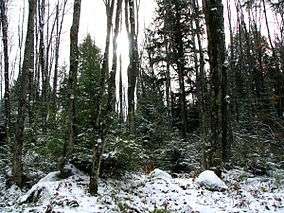Chequamegon-Nicolet National Forest
| Chequamegon-Nicolet National Forest | |
|---|---|
|
IUCN category VI (protected area with sustainable use of natural resources) | |
|
The Nicolet National Forest in November | |
 | |
| Location | Wisconsin, United States |
| Coordinates | 46°08′03″N 90°51′25″W / 46.13417°N 90.85693°WCoordinates: 46°08′03″N 90°51′25″W / 46.13417°N 90.85693°W |
| Area | 1,534,225 acres (6,208.79 km2)[1] |
| Established | 1933[2] |
| Governing body | U.S. Forest Service |
| Website | Chequamegon-Nicolet National Forest |
The Chequamegon-Nicolet National Forest (/ʃᵻˈwɑːmᵻɡən ˌnɪkəˈleɪ/; the q is silent)[3] is a 1,530,647-acre (6,194.31 km2) U.S. National Forest in northern Wisconsin in the United States. Much of the old growth forest in this region was destroyed by logging in the early part of the 20th century. Some of the trees that grow there today were planted by the Civilian Conservation Corps in the 1930s.
Legally two separate national forests—the Chequamegon National Forest and the Nicolet National Forest—the areas were established by presidential proclamations in 1933 and have been managed as one unit since 1993.
The Chequamegon National Forest comprises three units in the north-central part of the state totaling 865,825 acres (3,503.87 km2). In descending order of forestland area, it is located in parts of Bayfield, Ashland, Price, Sawyer, Taylor, and Vilas counties. Forest headquarters are in Park Falls. There are local ranger district offices in Glidden, Hayward, Medford, Park Falls, and Washburn.[4] Moquah Barrens Research Natural Area is located with the Chequamegon.[5] Lying within the Chequamegon are two officially designated wilderness areas of the National Wilderness Preservation System. They are the Porcupine Lake Wilderness and the Rainbow Lake Wilderness.
The Nicolet National Forest covers 664,822 acres (2,690.44 km2) of northeastern Wisconsin. It is located in parts of Forest, Oconto, Florence, Vilas, Langlade, and Oneida counties. Forest headquarters are in Rhinelander. There are local ranger district offices in Eagle River, Florence, Lakewood, and Laona. Bose Lake Hemlock Hardwoods and the Franklin Lake Campground are located in the Nicolet.[6][7] Lying within the Nicolet are three wildernesses—the Blackjack Springs Wilderness, the Headwaters Wilderness, and the Whisker Lake Wilderness.
Flora and fauna
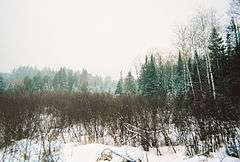
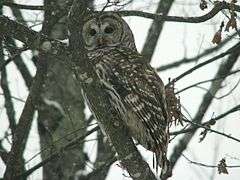
Remote areas of uplands, bogs, wetlands, muskegs, rivers, streams, pine savannas, meadows and many glacial lakes are found throughout these forests. Native tree species include Acer saccharum (sugar maple), Acer rubrum (red maple), and Acer spicatum (mountain maple), white, red, and black oaks, aspen, beech, basswood, sumac, and paper, yellow, and river birch. Coniferous trees, including red, white, and jack pine, white spruce and balsam fir are abundant due to a dense second growth. Eastern hemlock are also present as this is the westernmost limit of its distribution. Tamarack/black spruce bogs, cedar swamps and alder thickets are common. Blueberries, raspberries, blackberries, cranberries, serviceberries, ferns, mosses, cattails, and mushrooms also grow here, as well as many more shrubs and wildflowers.
White-tailed deer are numerous and many are hit by motorists on roads in northern Wisconsin year-round. Black bears, foxes, raccoons, rabbits, beavers, otters, squirrels, chipmunks, pheasants, grouse and wild turkeys are popular game in these northwoods. Elk and wolves have been reintroduced and there have been sightings of moose and marten.[8] Bird species include northern cardinal, blue jay, gray jay, common raven, boreal and black-capped chickadees, black-backed and pileated woodpeckers, red-winged blackbirds, owls, ducks, common loons, bald eagles, evening grosbeaks, red and white-winged crossbills and many species of thrushes, sparrows and warblers. Brook trout, rainbow trout, and brown trout are found in many miles of excellent streams. Walleye, small and largemouth bass, crappie, northern pike, and many species of panfish make the area's lakes famous for freshwater fishing. A record muskellunge, Wisconsin's state fish, was caught in these waters. The beauty, heritage, and recreational opportunities of these majestic forests draw thousands of tourists to the Chequamegon-Nicolet area every year.
These national forests are best known for recreation, including camping, hiking, fishing, cross country skiing, and snowmobiling.
The Chequamegon National Forest was also home to one of the two extremely low frequency antennae in the United States.
Gallery
- Early spring scene in Chequamegon-Nicolet National Forest, near Clam Lake
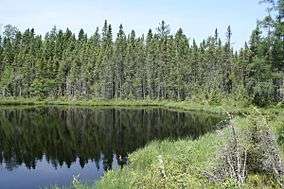 Blackjack Springs Wilderness in the Nicolet National Forest
Blackjack Springs Wilderness in the Nicolet National Forest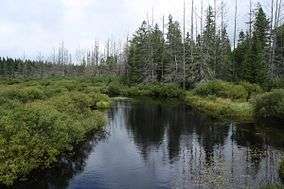 Headwaters Wilderness in the Nicolet National Forest, the Pine River
Headwaters Wilderness in the Nicolet National Forest, the Pine River Hidden Lakes Trail in the Chequamegon-Nicolet National Forest, about 10 miles (16 km) east of Eagle River
Hidden Lakes Trail in the Chequamegon-Nicolet National Forest, about 10 miles (16 km) east of Eagle River Welcome sign greeting visitors to the forest
Welcome sign greeting visitors to the forest Ranger station in Washburn
Ranger station in Washburn
See also
References
- ↑ "Land Areas of the National Forest System" (PDF). U.S. Forest Service. January 2012. Retrieved June 30, 2012.
- ↑ "The National Forests of the United States" (PDF). ForestHistory.org. Archived from the original (PDF) on February 12, 2013. Retrieved July 30, 2012.
- ↑ Miss Pronouncer: Hear how to pronounce; The Wisconsin pronunciation guide for cities, counties, Indians & lawmakers
- ↑ USFS Ranger Districts by State
- ↑ Moquah Barrens Research Natural Area
- ↑ Bose Lake Hemlock Hardwoods
- ↑ Franklin Lake Campground
- ↑ "Archived copy" (PDF). Archived from the original (PDF) on 2006-10-01. Retrieved 2007-02-20.
External links
![]() Media related to Chequamegon-Nicolet National Forest at Wikimedia Commons
Media related to Chequamegon-Nicolet National Forest at Wikimedia Commons
